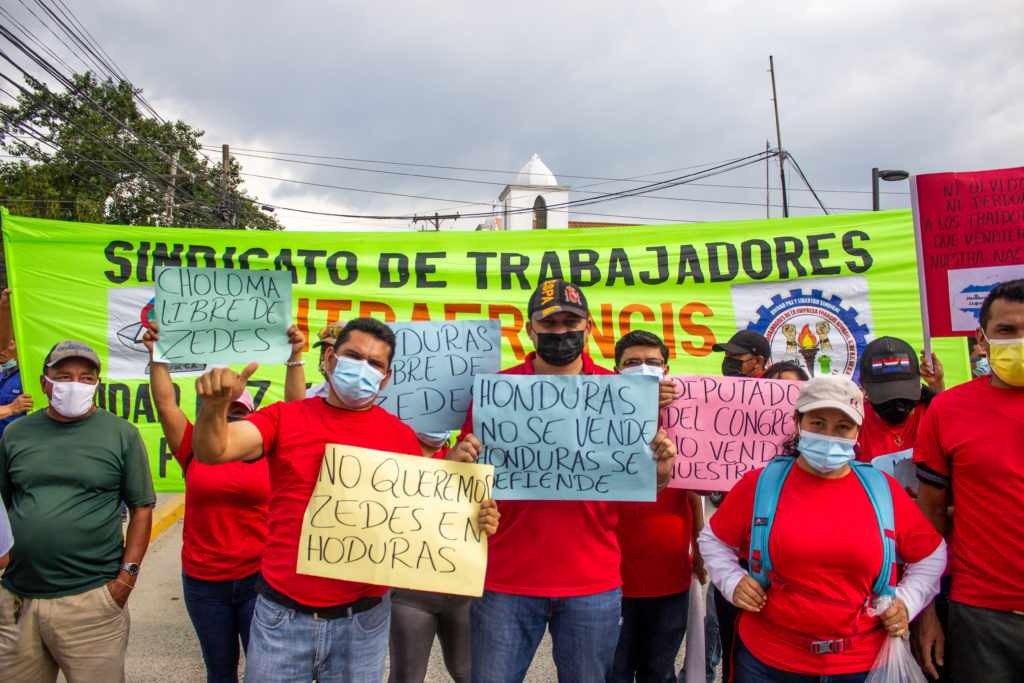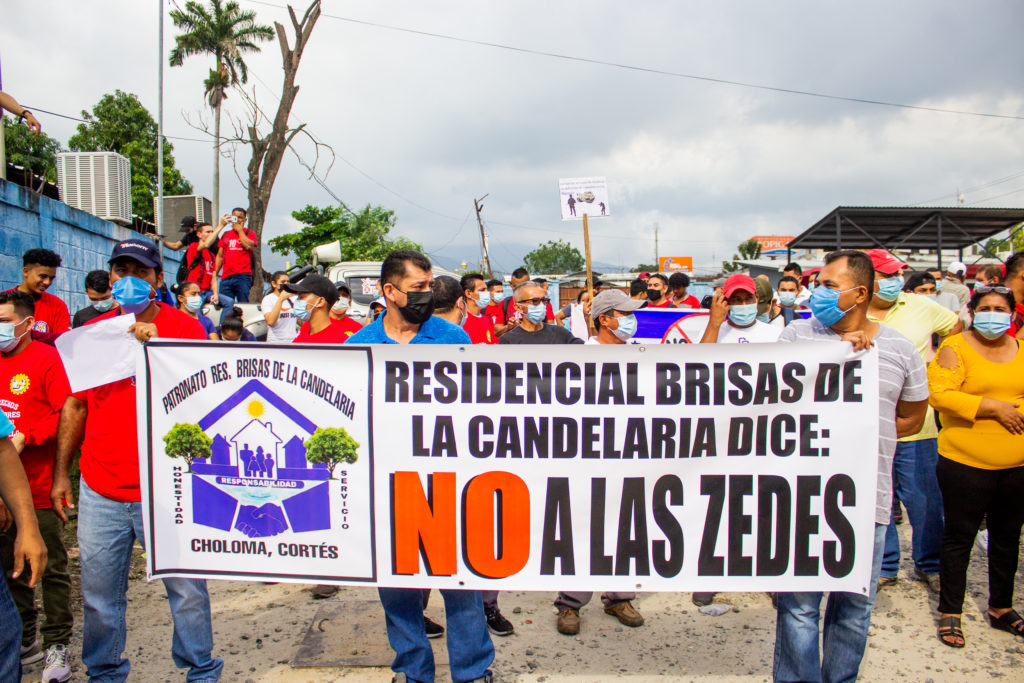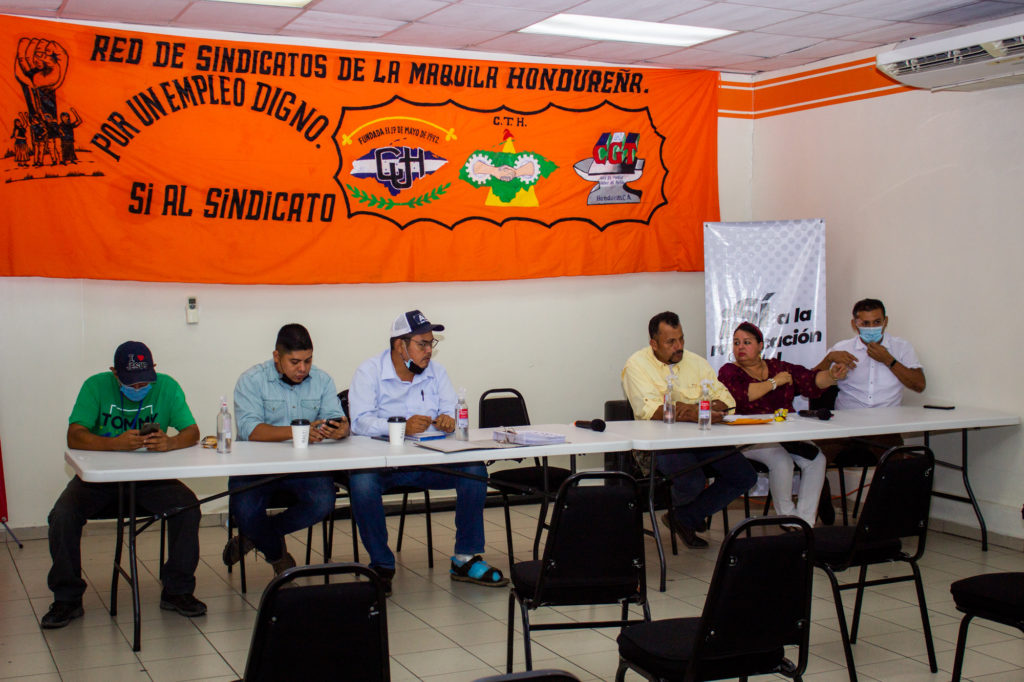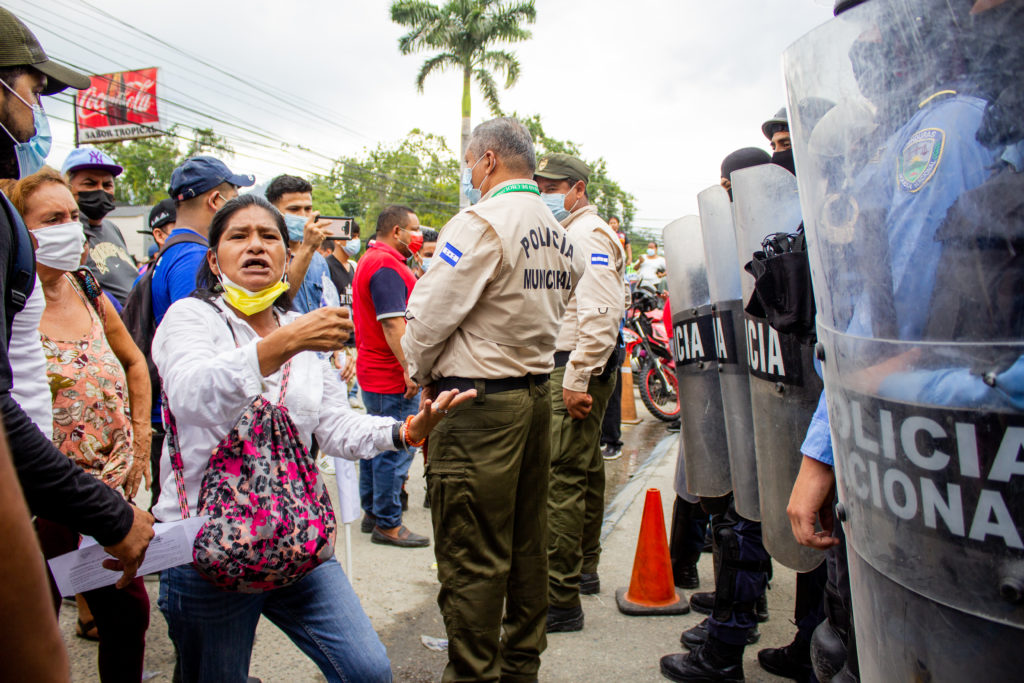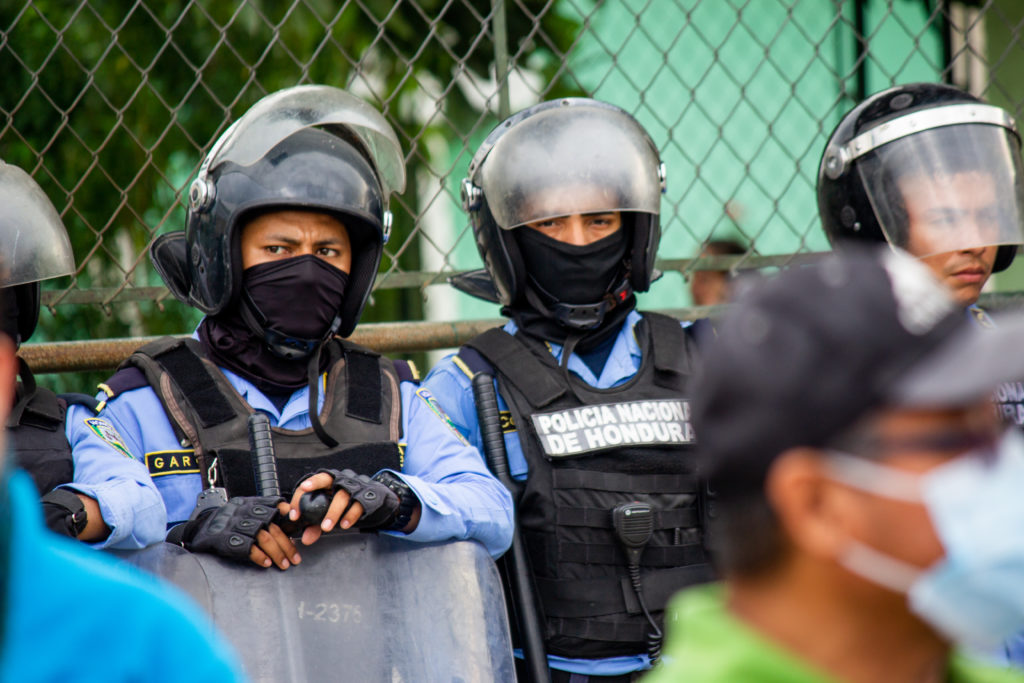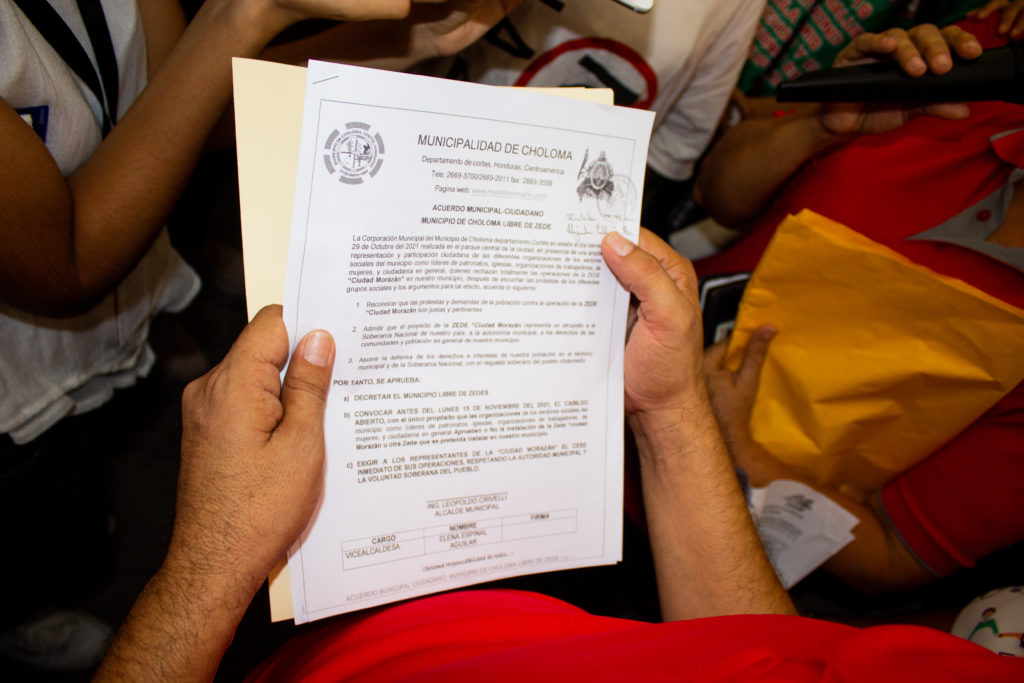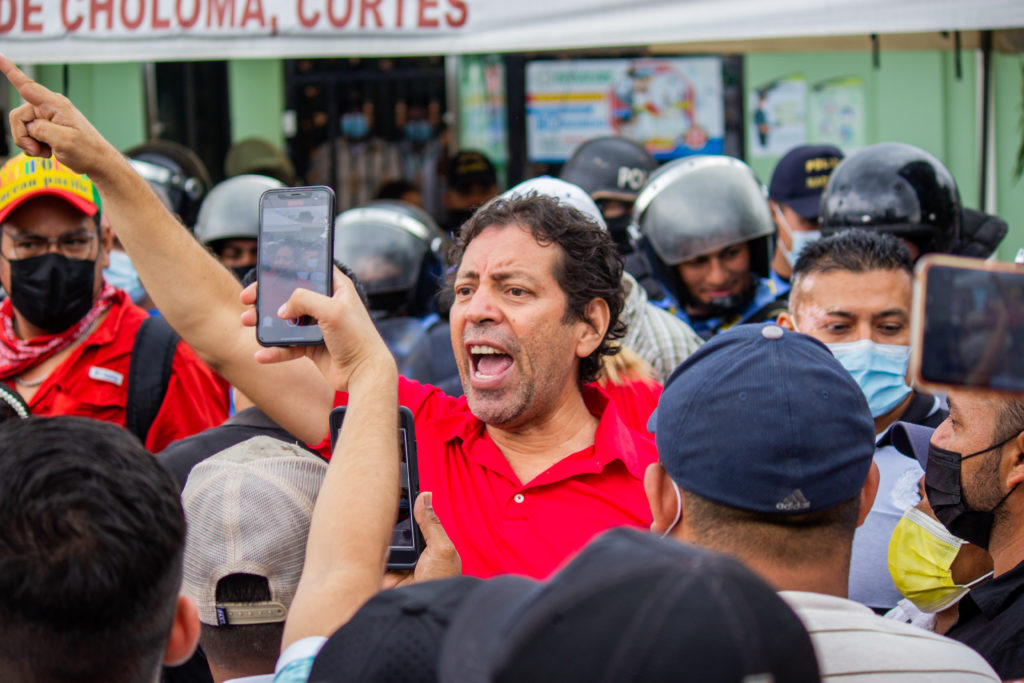Labor union leaders at a press conference denounced the development of Ciudad Morazán, an Employment and Economic Development Zone (ZEDE) in the northern Honduran city of Choloma, Cortés.
By Stephany Chávez and Laura García
Photos by Antonio Gutiérrez
In a press conference held on October 27, Joel Almendares, a representative of the Confederation of Honduran Workers (Confederación Unitaria de Trabajadores de Honduras – CUTH), demanded that Choloma’s mayor hold an open town hall meeting to prohibit the development of Employment and Economic Development Zones (Zona de Empleo y Desarrollo Económico – ZEDE) in the city.
He also called on all Honduran citizens to oppose ZEDEs throughout the country. Choloma mayor Leopoldo Crivelli, who has been criticized for being partial to ZEDE investors, responded by scheduling the town hall meeting just two days after the press conference.
On October 29, hundreds of demonstrators arrived promptly at 7:00 a.m. at the Texaco gas station on the main road into Choloma. The demonstrators were mostly members of the network of Honduran maquila (export factory) unions and concerned citizens from communities around Choloma.
Meanwhile, at 8:00 a.m., Mayor Crivelli was in a meeting in the central park with members of the Choloma municipal council. Thirty minutes later, Crivelli was making a public statement in the town hall meeting when the demonstrators arrived. They paused to listen to the mayor and then loudly began to demand that he put a stop to the development of the Ciudad Morazán ZEDE.
The atmosphere quickly became hostile and the shouts of angry protesters grew louder and louder. They yelled, “No to the ZEDE!” and “Our homeland is not for sale─our homeland will be defended!” In turn, the mayor’s supporters and municipal employees shouted the mayor’s nickname, “Polo! Polo! Polo!”
The commotion led the mayor to cancel the town hall meeting, and as he returned to the municipal office building escorted by municipal police and employees, a protester hit the mayor’s back. Others pelted him with water bottles and pursued him, demanding to be heard. Back in the safety of the municipal office building, the mayor called an urgent meeting with labor leaders, maquila industry representatives, local residents, and community associations.
María Delia Trejo joined the demonstration even though she said didn’t know what it was about. She was on her way to the municipal office building to pick up a property survey document when she unexpectedly encountered the protest. But she affirmed her support of the anti-ZEDE demonstrators.
Between shouts of protest, Trejo shared her frustrations as a single mother and former maquila worker who suffered an incapacitating injury to one of her hands. Sobbing, she told us, “How can a single mother like me buy a home in a model city [Ciudad Morazán]? How? It’s not fair ─ the poor are always neglected.”
In April 1987, Decree No. 37-87 authorized the establishment of industrial zones, which soon became one of the main sources of employment for Hondurans. Maquila factories and the textile industry expanded dramatically in the 1990s, especially in northern Honduras. The industry is noted for its unsafe working conditions and its disregard of minimum wage laws.
Read: People sick or incapacitated due to working conditions fired with pandemic as the excuse
José López, a Choloma resident, said that a committee of Choloma activists demanded that the mayor sign a pledge denouncing the ZEDE, and assert Choloma’s autonomy so that no “independent country” could be established within the municipality.
Santiago Palma, leader of the Francis Apparel Workers Union (Sindicato de Trabajadores de Francis Apparel – SITRAFRANCIS), emerged from the mayor’s meeting after a few minutes and announced that the town hall meeting had been rescheduled for November 7 at 9:00 a.m. in the main park and that the meeting’s purpose was to listen to public opinion so that a final decision could be made. Everyone waited outside the municipal office building to see the official document approving the meeting announced by Palma. Moments later, Rommel Galo, head of the logistics committee opposing the Ciudad Morazán ZEDE, came out of the mayor’s office with the document in hand.
The demonstrators returned to the main park to listen to Sandra Quiroz, secretary of the coordinating committee opposing the Ciudad Morazán ZEDE and a member of the Confederation of Honduran Workers, read the document issued by the Choloma municipality. It acknowledged the legitimacy and relevance of the public opposition to the Ciudad Morazán ZEDE, that it represented violations of the country’s sovereignty and municipal autonomy, and that it was an affront to Choloma residents.
ZEDE conference in Switzerland
On October 16, the inaugural Liberty in our Lifetime conference hosted by the Free Private Cities Foundation was held in Müllheim, Switzerland. Most of the program was dedicated to reviewing so-called Liberty Projects around the world, which included Ciudad Morazán in Choloma, Próspera in Roatán, and Guanaja Hills in Guanaja (Bay Islands).
Ten days later, the National Anti-ZEDE Movement (Movimiento Nacional contra las ZEDE) held a press conference at the Honduran Bar Association office in Tegucigalpa to share its perspective on the conference and similar events that might be hosted in the future by the Free Private Cities Foundation.
Christopher Castillo, the founder of the National Anti-ZEDE Movement and general coordinator for ARCAH (Alternativa de Reivindicación Comunitaria y Ambientalista de Honduras), a community and environmental defense organization, attended the press conference and spoke with Contracorriente about the presentations made by ZEDE promoters to potential investors attending the conference in Switzerland.
“There’s a lot of confusion about the words ‘auction’ and ‘bid’. We have always used the word ‘auction’ for a process that involves offering a product to the public and selling it to the highest bidder,” said Castillo.
“But what happened [at the conference in Switzerland] was much more complex. In that case, the Honduran land for sale also included its institutionality, sovereignty, and legality─all of those things were for sale,” he said.
The whole ZEDE conflict is cloaked in utmost secrecy. Online attendance at the conference was poor. “At its peak, there were 67 people online,” said Castillo, who attended the entire virtual portion of the conference; “The secrecy about ZEDEs is such that the Swiss news media didn’t know about the conflict surrounding these Liberty Projects.”
Contracorriente purchased a ticket to attend the virtual conference and later requested a recording of the proceedings. The conference host─the Free Private Cities Foundation─responded that they were still in the “post-production process” two weeks after the conference.
“There were many discussions at the conference about Honduras. All the investors were talking about Honduras, about how they were looking for a country with specific laws authorizing such projects. And the only country in the world with this kind of legislation is Honduras, even though it’s an illegitimate law,” Castillo said.
“No nation anywhere in the world would tolerate the ceding of its sovereignty or territory. This is what has ignited so much conflict throughout history─territory and sovereignty,” said Castillo. Referencing the cryptocurrency companies that co-sponsored the conference, Castillo claims that the ZEDE and other Liberty projects “were not presented as extractivist projects, but rather as opportunities for conquest.”
Castillo also warned about “the ‘seasteading’ initiatives presented at the conference, which are small societies built over bodies of water with significant political autonomy.” These floating cities lie outside any government jurisdiction, and would probably be developed in Honduran waters near its coral reefs.
Carlos Fortín Lardizabal, the technical secretary of the Ciudad Morazán ZEDE in Choloma, told Contracorriente that the October 16 presentations in Switzerland “were misleading─those auctions didn’t happen.” He defended the ZEDE he represents and said, “Ciudad Morazán is a source of development and employment … if the ZEDE is shut down, the ones hurt will be the people who live and work there.”
“Honduras is the country the ZEDE promoters are betting on because they urgently need a success story to show the world … and Honduras has all the right conditions,” said Castillo.

